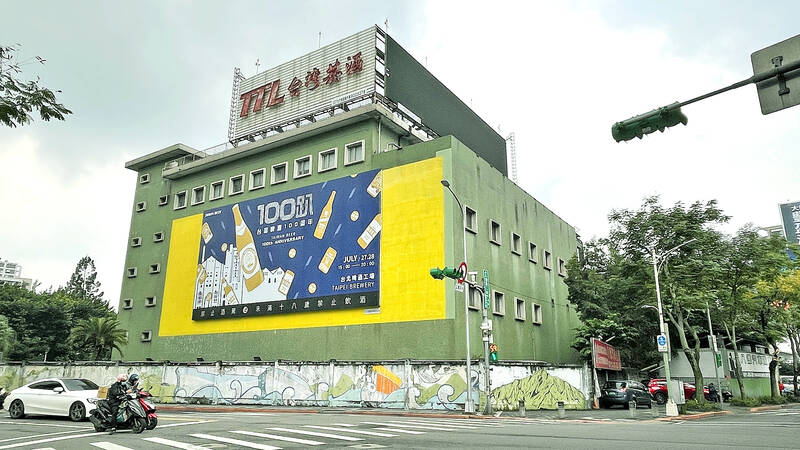The prices of some Taiwan Beer products would be raised over the summer to reflect higher international raw material prices, Taiwan Tobacco and Liquor Corp (TTL, 台灣菸酒) said yesterday.
Effective from June 1, the company raised the prices of Gold Label, Classic and 18 Days Draft brews in kegs and bottles by 1 to 2 percent for large-scale wholesalers and by 3 to 7 percent for small-scale wholesalers, it said.
Following the hike, the price of a keg of beer rose by an average of NT$10 (US$0.33) per liter and the price of a case of beer containing a dozen 600ml bottles rose by average of NT$36 to NT$60, TTL said.

Photo: George Tsorng, Taipei Times
As the adjustment only altered wholesale prices, the changes would mainly be noticeable at venues such as “hot-fry” restaurants and nightclubs, the company said.
The price of canned beer sold at supermarkets and convenience stores would not be raised until August or September, after a new batch of those beers has been produced, it said.
TTL said that it had not raised Taiwan Beer prices in more than 20 years.
It said that as a state-run corporation, it has to remain profitable to transfer a required NT$6 billion to the national coffers each year, which is why the price hikes were necessary.
The company said that many imported beer brands increased their prices last year in light of higher raw material costs.
In terms of its other products, TTL said the price of its rice wine — which it sells at a loss — would remain the same, due to its widespread use as a cooking ingredient.

Taiwan Semiconductor Manufacturing Co (TSMC, 台積電) yesterday said that its investment plan in Arizona is going according to schedule, following a local media report claiming that the company is planning to break ground on its third wafer fab in the US in June. In a statement, TSMC said it does not comment on market speculation, but that its investments in Arizona are proceeding well. TSMC is investing more than US$65 billion in Arizona to build three advanced wafer fabs. The first one has started production using the 4-nanometer (nm) process, while the second one would start mass production using the

A TAIWAN DEAL: TSMC is in early talks to fully operate Intel’s US semiconductor factories in a deal first raised by Trump officials, but Intel’s interest is uncertain Broadcom Inc has had informal talks with its advisers about making a bid for Intel Corp’s chip-design and marketing business, the Wall Street Journal reported, citing people familiar with the matter. Nothing has been submitted to Intel and Broadcom could decide not to pursue a deal, according to the Journal. Bloomberg News earlier reported that Taiwan Semiconductor Manufacturing Co (TSMC, 台積電) is in early talks for a controlling stake in Intel’s factories at the request of officials at US President Donald Trump’s administration, as the president looks to boost US manufacturing and maintain the country’s leadership in critical technologies. Trump officials raised the

‘SILVER LINING’: Although the news caused TSMC to fall on the local market, an analyst said that as tariffs are not set to go into effect until April, there is still time for negotiations US President Donald Trump on Tuesday said that he would likely impose tariffs on semiconductor, automobile and pharmaceutical imports of about 25 percent, with an announcement coming as soon as April 2 in a move that would represent a dramatic widening of the US leader’s trade war. “I probably will tell you that on April 2, but it’ll be in the neighborhood of 25 percent,” Trump told reporters at his Mar-a-Lago club when asked about his plan for auto tariffs. Asked about similar levies on pharmaceutical drugs and semiconductors, the president said that “it’ll be 25 percent and higher, and it’ll

CHIP BOOM: Revenue for the semiconductor industry is set to reach US$1 trillion by 2032, opening up opportunities for the chip pacakging and testing company, it said ASE Technology Holding Co (日月光投控), the world’s largest provider of outsourced semiconductor assembly and test (OSAT) services, yesterday launched a new advanced manufacturing facility in Penang, Malaysia, aiming to meet growing demand for emerging technologies such as generative artificial intelligence (AI) applications. The US$300 million facility is a critical step in expanding ASE’s global footprint, offering an alternative for customers from the US, Europe, Japan, South Korea and China to assemble and test chips outside of Taiwan amid efforts to diversify supply chains. The plant, the company’s fifth in Malaysia, is part of a strategic expansion plan that would more than triple